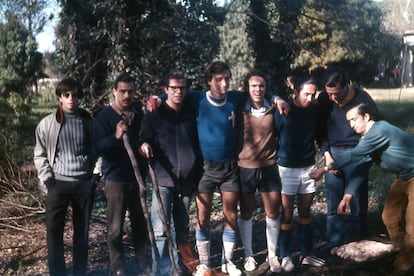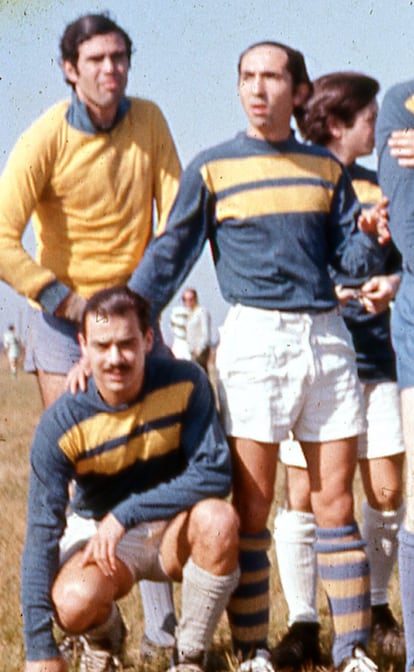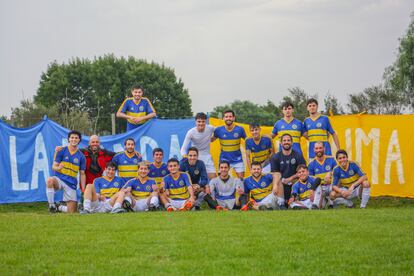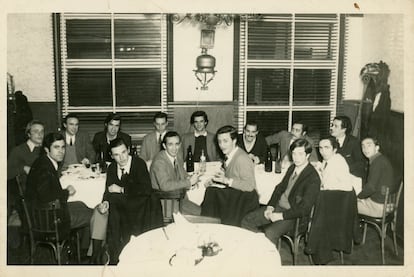‘Society of the Snow,’ the spirit of Numa Turcatti and the soccer team named after him
The club, once led by the young man, was founded in 1966 as Loyola FC. Five of the founders were victims of the Andes tragedy and one of them did not board the plane to Chile because his university exam had been changed

They say that you die when you are forgotten. Perhaps that is why Numa Turcatti, one of the young men who died in the world-famous Andes tragedy, is still alive. Indeed, a Montevideo soccer team of Uruguay’s University Sports League is named after him. This team, originally called Loyola FC, was founded in the summer of 1966 by a group of 18-year-old friends. They included Turcatti and four other teammates who were on plane 571 of the Uruguayan Armed Forces: Arturo Nogueira, Julio Martínez Lamas Flaco, Alfredo Pancho Delgado and José Luis Coche Inciarte. Only the last two survived, and they would later witness the change of name in 1973. Juan Antonio Bayona’s recently released film, Society of the Snow, portrays how Turcatti was the spirit of the Andes. But he also was and continues to be the soul of this sports team.

They named their football team Loyola because Saint Ignatius of Loyola is the patron saint of the Seminary School of Montevideo, where they studied in high school. Their intention was to have an excuse to continue seeing each other and not lose contact with each other once they started university. Raúl Zorrilla (75 years old), another of the driving forces behind the foundation of the team, recalls in a conversation with EL PAÍS that during their first matches they used jerseys borrowed from Boca Juniors, a club of which they were big fans. That is how they identified the colors of their kit, blue with two yellow stripes, unlike the Argentinian team, which only has one.
In 1970, Loyola gathered momentum and joined Uruguay’s University Sports League, one of the most important non-professional competitions in the country, with a 100-year history. Numa Turcatti was the team’s delegate and he was in charge of the administrative side, representing the club and securing the pitches. “He was a natural captain because that was the way he was, very generous,” clarifies Zorrilla.

Turcatti was a forward and wore the number seven on his back. He had exceptional physical strength, was a fine student and possessed extraordinary character, as Alfredo Cibils (76 years old), also a founder of Loyola, remembers him. Cibils’ account to this newspaper coincides with the image of Numa in Society of the Snow, played by the Uruguayan actor Enzo Vogrincic. “At the beginning, hardly anyone knew him in the mountains, because he was such a reserved guy. But he won them all over, he always cared for the wounded. He was interested in everybody.”
Cibils’ name was on the boarding list to travel to Chile on that flight that never made it to the city of Santiago, but seven hours earlier he had to cancel the trip because his university exam had been changed. “In the street people would say to me, ‘Didn’t you die?’ They would hear my name on the radio along with the rest of the 45 disappeared,” he explains in a telephone conversation. Cibils was a university classmate of Numa and Pancho. “All three of us were in law school. We were very close.” He is still good friends with the latter. “We go on trips together with our families, never by plane because since the accident he never wanted to fly again.” Cibils also says that Pancho has not made any further comments about what happened in the Andes because he was the spokesman for what happened at the time. “He told me ‘I spoke that day, but I will never do it again,’ and he stuck to his word.”
When the accident happened on October 13, 1972, Loyola was on course to ascend to the first division of the University League. The team’s dream, however, was dashed when the group learned of the disappearance of their five friends. “We didn’t win any more games that season and were relegated to the [third division]. It was a tremendous shock,” regrets Zorrilla.
Turning point after the Andes
On December 22 of that same year, the Loyola players were told that there were survivors from the plane in which their teammates had been traveling. But when they were given the list of names, Numa’s name was missing. “I lost my best friend,” says Cibils. At that time they wanted to rename the team in honor of their captain who had died in the mountains, but as the league had already begun they were unable to do so. Eventually, the club was renamed from Loyola FC to Numa Turcatti in 1973.
Numa Turcatti currently has four categories. The most important is the senior team, whose captain is Esteban Fermer, known as Pulga. This player insists that the spirit of the team today is the same as in its beginnings. “Those who wear the Numa jersey feel that the team is really theirs, that’s the motto.”

Rodrigo Cadenas, current president of the club, is the son of Gonzalo Cadenas, another of the founders of the 1966 team, who was also Turcatti’s cousin. “It is a club of friends and it has lasted so many years because of that,” stresses Cadenas. Cibils holds car keys bearing the Numa crest and Zorrilla keeps as a souvenir the notebooks in which he wrote down the results or line-ups during his years as a player. “The club’s former players follow the current team very closely,” says Cadenas. “When we seniors go there, we always say a few words of encouragement and thanks to the young people,” Zorrilla says.
Federico De Simone, a former player and current supporter of the club, believes that the spirit of Numa Turcatti has been passed down through the generations. “Numa gave his life to those he loved, as he himself says in his letter: ‘There is no greater love than the one that lays down his life for his friends,’” Zorrilla says. Cibils suggests that Turcatti was very shy and may not have wanted his name to resonate as much as it does now. “But it is in his honor that we are speaking,” he concludes. Zorrilla applauds the fact that current and former players get together once a year for a barbecue at the end of the season. “We’re a real family, I feel that Numa is guiding us from heaven.”

Sign up for our weekly newsletter to get more English-language news coverage from EL PAÍS USA Edition
Tu suscripción se está usando en otro dispositivo
¿Quieres añadir otro usuario a tu suscripción?
Si continúas leyendo en este dispositivo, no se podrá leer en el otro.
FlechaTu suscripción se está usando en otro dispositivo y solo puedes acceder a EL PAÍS desde un dispositivo a la vez.
Si quieres compartir tu cuenta, cambia tu suscripción a la modalidad Premium, así podrás añadir otro usuario. Cada uno accederá con su propia cuenta de email, lo que os permitirá personalizar vuestra experiencia en EL PAÍS.
¿Tienes una suscripción de empresa? Accede aquí para contratar más cuentas.
En el caso de no saber quién está usando tu cuenta, te recomendamos cambiar tu contraseña aquí.
Si decides continuar compartiendo tu cuenta, este mensaje se mostrará en tu dispositivo y en el de la otra persona que está usando tu cuenta de forma indefinida, afectando a tu experiencia de lectura. Puedes consultar aquí los términos y condiciones de la suscripción digital.








































